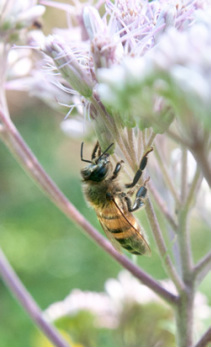BEE AWARE - "bee friendly" plants sold at big box retailers may be harmful to bees

Imagine my delight at finding Joe Pye Weed, Coreopsis, and even Agastache nestled amongst the usual selections of Purple Coneflower and Black Eyed Susans when visiting my local Lowe's garden center! It seems as though Lowe's and Home Depot may finally be aware of the movement to establish bee-friendly gardens. So, imagine my disappointment upon discovering a recent study showing that many of these "bee-friendly" options have been pre-treated with a class of neonicotinoid pesticide known to be harmful to bees.
In a pilot study co-authored by the Pesticide Research Institute, found that 7 of 13 samples of garden plants purchased at top retailers in Washington D.C., the San Francisco Bay Area and Minneapolis contain neurotoxic pesticides known as neonicotinoids that studies show could harm or kill bees and other pollinators. (read more at: foe.org)
What are neonicotinods?
Neonicotinoids are a class of systemic pesticide, which means the pesticide can be found in all parts of a treated plant, including pollen and nectar where it is toxic to pollinators. The EPA in the U.S. and similar agencies in Europe are investigating this class of pesticide for its link to mass pollinator die-offs and colony collapse disorder.
While there is still much research to be done, there are many factors that do raise concerns about neonicotinoids and their impact on the environment:
What should I do?
A troubling concern about the recent study is that there are currently no regulations requiring retailers to indicate how or if plants have been treated. Where the USDA regulates what we can label as "organic" for food and healthcare products, no such regulation exists for garden plants.
Article and Photo by Justin Wheeler
In a pilot study co-authored by the Pesticide Research Institute, found that 7 of 13 samples of garden plants purchased at top retailers in Washington D.C., the San Francisco Bay Area and Minneapolis contain neurotoxic pesticides known as neonicotinoids that studies show could harm or kill bees and other pollinators. (read more at: foe.org)
What are neonicotinods?
Neonicotinoids are a class of systemic pesticide, which means the pesticide can be found in all parts of a treated plant, including pollen and nectar where it is toxic to pollinators. The EPA in the U.S. and similar agencies in Europe are investigating this class of pesticide for its link to mass pollinator die-offs and colony collapse disorder.
While there is still much research to be done, there are many factors that do raise concerns about neonicotinoids and their impact on the environment:
- Neonicotinoids can persist in soil for months or years after a single application. Measurable amounts of residues were found in woody plants up to six years after application.
- Untreated plants may absorb chemical residues left over in the soil from the previous year.
- Products approved for homeowners to use in gardens, lawns, and on ornamental trees have manufacturer-recommended application rates up to 120 times higher than rates approved for agricultural crops. (Source: Xerces Society)
What should I do?
A troubling concern about the recent study is that there are currently no regulations requiring retailers to indicate how or if plants have been treated. Where the USDA regulates what we can label as "organic" for food and healthcare products, no such regulation exists for garden plants.
- If selecting plants for a pollinator friendly garden, it is best to work with a reputable dealer of native plants.
- Ask Questions. Ask your nursery if they are propagating their own plant material, if they use systemic pesticides, and if so what kind.
- Be educated. This Article provides a list of neonicotinoid products used in the United States.
- When in doubt - grow your own!
Article and Photo by Justin Wheeler
Sources:
What is a neonicotinoid? Texas A&M University
Are neonicotinoids killing bees? The Xerces Society
Field Research on Bees Raises Concern About Low-Dose Pesticides Science Magazine
Bee die-offs: New tests find bee-killing pesticides in 'bee-friendly' plants from garden centers nationwide Friends of the Earth
What is a neonicotinoid? Texas A&M University
Are neonicotinoids killing bees? The Xerces Society
Field Research on Bees Raises Concern About Low-Dose Pesticides Science Magazine
Bee die-offs: New tests find bee-killing pesticides in 'bee-friendly' plants from garden centers nationwide Friends of the Earth
